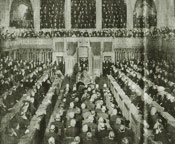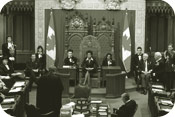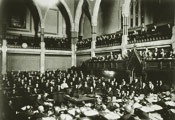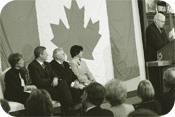At Work in the Chamber
In addition to his duties in the Chamber, the Speaker represents the House of Commons in its relations with the Crown, the Senate and authorities outside Parliament. In this capacity, he welcomes many visiting dignitaries and delegations, and represents the House during national events and visits abroad. The Speaker also has the standard responsibilities of a Member of Parliament.
In general, the House of Commons follows a parliamentary calendar that establishes a schedule of sittings and adjournments running from September to June. These sittings and adjournments are grouped together into sessions. There can be several sessions in a Parliament or as few as one. The beginning of each session is highlighted by the Speech from the Throne, which outlines the government's commitments for that session.
In 2005-2006, the House continued its work as part of the first session of the 38th Parliament. On November 24, 2005, the Leader of the Official Opposition moved a motion of non-confidence which was put to a vote on November 28, 2005 and adopted. As a result, business ended on November 29, 2005, when the Governor General, acting on the advice of the Prime Minister, dissolved Parliament and called a general election.
Maintaining Order in the House
The Speaker of the House of Commons maintains order in the Chamber and ensures that every Member respects the rules and practices of the House. The Speaker is elected by secret ballot.
The Speaker is assisted by three other Chair Occupants, who are selected from among the Members to serve as presiding officers. They help the Speaker ensure that the House follows the rules and traditions that govern it. The Speaker proposes candidates for the positions after consulting with the leaders of recognized political parties in the House. During the 38th Parliament, the Honourable Peter Milliken was Speaker and the following Members served as presiding officers: Chuck Strahl, Deputy Speaker and Chair of Committees of the Whole; Marcel Proulx, Deputy Chair of Committees of the Whole; and the Honourable Jean Augustine, Assistant Deputy Chair of Committees of the Whole.

Hansard is a report of the debates in the House of Commons-not a verbatim transcript as many believe, but a record with slight alterations to make it more precise and readable. Editors can correct errors in figures, improve grammar and eliminate minor repetition. Members can do the same with their speeches; however, they can never, as tempting as it may occasionally be, change the substance and meaning of their words.
The name of the report comes from T.C. Hansard's Hansard's Parliamentary Debates, a reprint that began in 1812 of the speeches given in the Parliament of the United Kingdom. Hansard is now used to designate the official debates of parliaments throughout the English-speaking world.

Creating Canada's Laws
Adopting and amending laws is one of the major functions of the House of Commons. Federal legislation starts out as a "bill," which is a proposal to create a new law or to amend an existing law. A bill must be approved (in identical form) by both the Senate and the House of Commons, and receive Royal Assent before it can become law. The time required to pass a bill can vary, depending on the urgency of the matter, its complexity and the degree of consensus among Members.
There are two main types of bills: public and private. Generally, public bills concern matters of public policy, such as agriculture or finance. They can be sponsored by the government and introduced by a Cabinet Minister (government bill), or sponsored by Private Members (any Member who is not a Minister). The latter is called a Private Member's public bill.
Private bills are designed to exempt an individual or group from the application of the law, such as a bill to incorporate a private company. For example, Bill S-25, An Act to amend the Act of incorporation of The General Synod of the Anglican Church of Canada, received Royal Assent on May 19, 2005.
Bills may also be introduced in the Senate. However, any bills to raise or spend public funds (known as money bills) must be introduced in the House of Commons.
From April 1, 2005 to March 31, 2006, there were 45 government bills introduced in the House of Commons. This proposed legislation covered a range of social, economic and political issues, such as:
- burden of proof regarding proceeds of crime
- civil marriage
- election advertising
- helping Canadians deal with high energy costs
- Labrador Inuit land claims
- strengthening animal cruelty laws
- the prevention of street-racing
- wage earner protection as a result of bankrupt or insolvent companies
Over the past fiscal year, 121 Private Members' public bills were introduced. Like the legislation proposed by the government, these bills focused on a variety of issues of importance to the public, such as:
- changes to foreign property rules for retirement savings plans
- creating a national day of appreciation for members of the Canadian Forces, police officers, firefighters and others
- health-care services for autistic persons
- increasing employment insurance benefit periods based on regional unemployment rates
- personal identity theft
- publishing information concerning youth charged as adults in criminal court
- regulating Voice over Internet Protocol services
As a result of changes to the Standing Orders in the 37th Parliament, more Private Members' public bills were approved in principle at second reading. Excluding Private Members' public bills changing the name of electoral districts, four Private Members' public bills received Royal Assent (and hence became law), in part due to the short duration of the 38th Parliament.
Government bills introduced in 2005-2006: 45
Private Members' public bills introduced in 2005-2006: 121
Members of the House of Commons can suggest amendments to bills. Over 1,000 motions of amendment were proposed at committee and report stages during the 38th Parliament.
A number of booklets and fact sheets are available that describe the legislative process in simple terms. Inside Canada's Parliament, Guide to the Canadian House of Commons, and How Canadians Govern Themselves are just some of the publications offered on the Parliament of Canada Web site. A recent addition to the site, House of Commons Procedure and Practice, by former Clerk of the House of Commons Robert Marleau and former Deputy Clerk Camille Montpetit, provides detailed explanations of the workings of the House of Commons.
Maintaining Responsible Government
One of the most important functions of the House of Commons is to question the government about its policies and performance, and give it the opportunity to explain its actions. Members of Parliament carry out this role by asking questions during Question Period, submitting questions to the government in writing, and selecting topics for debate on specified days.

Her Excellency the Right Honourable Michaëlle Jean, Governor General of Canada, gives Royal Assent to legislation after it has been reviewed and approved by both the Senate and the House of Commons.
Photo: © Senate of Canada

Journalists wait in the House of Commons foyer to speak to Members after Question Period.
Photo: © House of Commons
During each sitting day, 45 minutes are reserved for oral questions, or Question Period as it is more widely known. During this time, members of the opposition parties can ask questions of the Prime Minister, Cabinet Ministers and committee chairpersons. Members of the government who are not in Cabinet may also pose questions. These questions concern the programs, policies and activities under the Cabinet's responsibility. Either a Minister or a parliamentary secretary responds. When detailed, lengthy or technical information is sought from the government, questions can be submitted in writing. The replies are subsequently tabled in the House of Commons.
Overall, 3,232 oral questions were posed and 133 written questions submitted in the past fiscal year. During this period, an average of 38 questions per sitting day were asked during Question Period.
Opposition parties can also raise issues of concern by selecting the topics for the House to debate on allotted days (also known as opposition or supply days). Each calendar year, 22 days are set aside to consider these motions sponsored by opposition Members. The allotted days are divided based on party representation and as a result of ongoing consultations among opposition parties. Over the past fiscal year, the issues discussed on allotted days included the following:
- a Canadian strategy for health
- a strategy to help older workers
- child care
- confidence in the government
- discrimination on the basis of political opinion
- employment insurance
- the 39th general election
- the Access to Information Act
- the Air India bombing
- the mandate of the Gomery Commission
- the sponsorship program
- the World Trade Organization
Members can also participate in special debates, referred to as "take-note debates," which focus on important public issues. They are held after the ordinary hour of daily adjournment and usually continue late into the evening. In 2005-2006, the following topics were debated:
- Canada's military mission in Afghanistan
- cross-border sale of drugs via the Internet
- democratic reform and citizens' engagement
- RCMP and law enforcement
- softwood lumber
- supply management
- U.S. Western Hemisphere Travel Initiative

For centuries in the United Kingdom, Members' speeches were guarded out of fear they would not be well received by the Crown. Since reporters could be arrested for taking notes, they would rely on memory and, remarkably, commit the speeches to paper upon leaving the Chamber. In many legislatures, including Canada's, visitors still are not allowed to enter the galleries with pen and paper.
In 1837, Canadian reporters gained the right to record the debates. However, these records consisted of biased and incomplete newspaper reports, and compilations of articles nicknamed the Scrapbook Hansard. Eleven months after the first official Hansard in May 1880, a motion was called for its discontinuance. Some Members didn't want their speeches to be published; others didn't want to bear the expense of producing the reports.
Sir John A. Macdonald passionately argued, "I hope we shall not make such a relapse into barbarism as to throw over the only means by which after generations shall be able to learn…what were the moving impulses of the people and their representatives in Parliament." The speech was recorded in the debates, and the resolution defeated.

Tabling Documents
Tabling a document is a formal way of presenting information to the House of Commons and putting it on the official public record. A variety of reports must be tabled, including the annual reports of various departments and agencies, non-judicial Order-in-Council appointments, and government responses to committee reports. Ministers can table any report or paper concerning matters related to the administrative responsibilities of the government.
In 2005-2006, 1,455 parliamentary documents were tabled in the House of Commons, including the First Report of the Commission of Inquiry into the Sponsorship Program and Advertising Activities (Gomery Commission), a Report on Democratic Reform, and the Annual Report of the Privacy Commissioner of Canada.
Establishing the Rules for the Chamber

Speaker Milliken marks Flag Day against a backdrop of the original Canadian flag that flew from the Peace Tower in 1965.
Photo: © C. Diotte
The daily activities in the Chamber are managed according to a set of rules known as the Standing Orders as well as a series of practices and traditions, some of which came to Canada from Great Britain and some of which were developed here. The House of Commons continues to develop and modify its rules and practices to help it conduct business effectively. In 2005-2006, very few changes were made to the Standing Orders, but the House made permanent the rules governing Private Members' Business, which had been provisional in nature since March 2003. These rules represent a significant modification since they allow all Members of the House, with the exception of the Speaker, the Deputy Speaker, Cabinet Ministers and their parliamentary secretaries, to put forward a bill or a motion for debate and eventual vote in the House.
Rules and practices can also be changed through rulings or decisions by the Speaker. In some cases, when more extensive procedural research is not required, these rulings are delivered "on the spot" by the Speaker. When a more in-depth examination of the facts of the case, past practices and precedents is required, a written ruling is prepared. In the period of this report, the Speaker delivered 49 rulings, which dealt with such questions as:
- comments discrediting the reputation of a Senator
- committees' authority to revoke an Order-in-Council appointment
- disclosure of in-camera proceedings
- improper use of fax lines by individuals or organizations with no affiliation with the House, and the registration of Internet domain names of certain Members of the House of Commons
- mailings and the use of Members' mailing frank
- the alleged failure of the government to answer a question on the Order Paper
- the conduct of the House of Commons Ethics Commissioner


